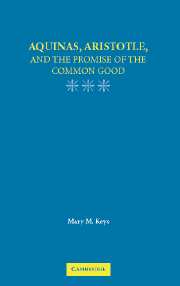Book contents
- Frontmatter
- Contents
- Acknowledgments
- PART I VIRTUE, LAW, AND THE PROBLEM OF THE COMMON GOOD
- 1 Why Aquinas? Reconsidering and Reconceiving the Common Good
- 2 Contemporary Responses to the Problem of the Common Good: Three Anglo-American Theories
- PART II AQUINAS'S SOCIAL AND CIVIC FOUNDATIONS
- PART III MORAL VIRTUES AT THE NEXUS OF PERSONAL AND COMMON GOODS
- PART IV POLITICS, HUMAN LAW, AND TRANSPOLITICAL VIRTUE
- Works Cited
- Index
2 - Contemporary Responses to the Problem of the Common Good: Three Anglo-American Theories
Published online by Cambridge University Press: 25 July 2009
- Frontmatter
- Contents
- Acknowledgments
- PART I VIRTUE, LAW, AND THE PROBLEM OF THE COMMON GOOD
- 1 Why Aquinas? Reconsidering and Reconceiving the Common Good
- 2 Contemporary Responses to the Problem of the Common Good: Three Anglo-American Theories
- PART II AQUINAS'S SOCIAL AND CIVIC FOUNDATIONS
- PART III MORAL VIRTUES AT THE NEXUS OF PERSONAL AND COMMON GOODS
- PART IV POLITICS, HUMAN LAW, AND TRANSPOLITICAL VIRTUE
- Works Cited
- Index
Summary
Contemporary political philosophy has not overlooked the problem of the common good; indeed, scholars of political thought and normative theory have recently reviewed the question of the common good from a variety of vantage points. Anglo-American (or broadly “analytic”) political thought is no exception. Not surprisingly, given the contours of the current Anglo-American world, some prominent representatives of this tradition of inquiry are sensitive to the desirability of balancing (or completing, or replacing) rights-based theoretical and civic discourse with a deeper appreciation of shared goals and goods, including goods of character. Against the backdrop of the previous chapter's explication of the promise and problem of the common good, this chapter surveys the approaches to the common good found in seminal works by three prominent Anglo-American theorists: John Rawls, Michael Sandel, and William Galston.
I will argue that Rawls's academic blockbuster A Theory of Justice (TJ: 1971; rev. ed. 1999), philosophically more important and engaging, in my view, than Rawls's later writings postdating his pragmatic or “political” turn (see Rawls 1985, 1993), accords an unusually significant place for a liberal theory to the concept of the common good. I paint in broad strokes Rawls's deontological contractarian theory of the common good, one paradoxically built on a strong recognition of the radical separateness of desires and ends pursued by diverse human beings, as Rawls presents it in Part Three of TJ.
- Type
- Chapter
- Information
- Aquinas, Aristotle, and the Promise of the Common Good , pp. 29 - 56Publisher: Cambridge University PressPrint publication year: 2006



